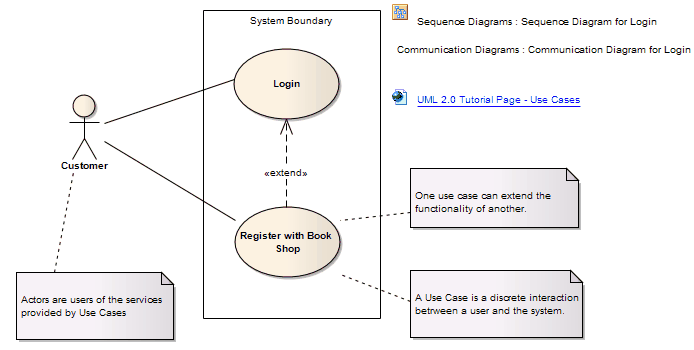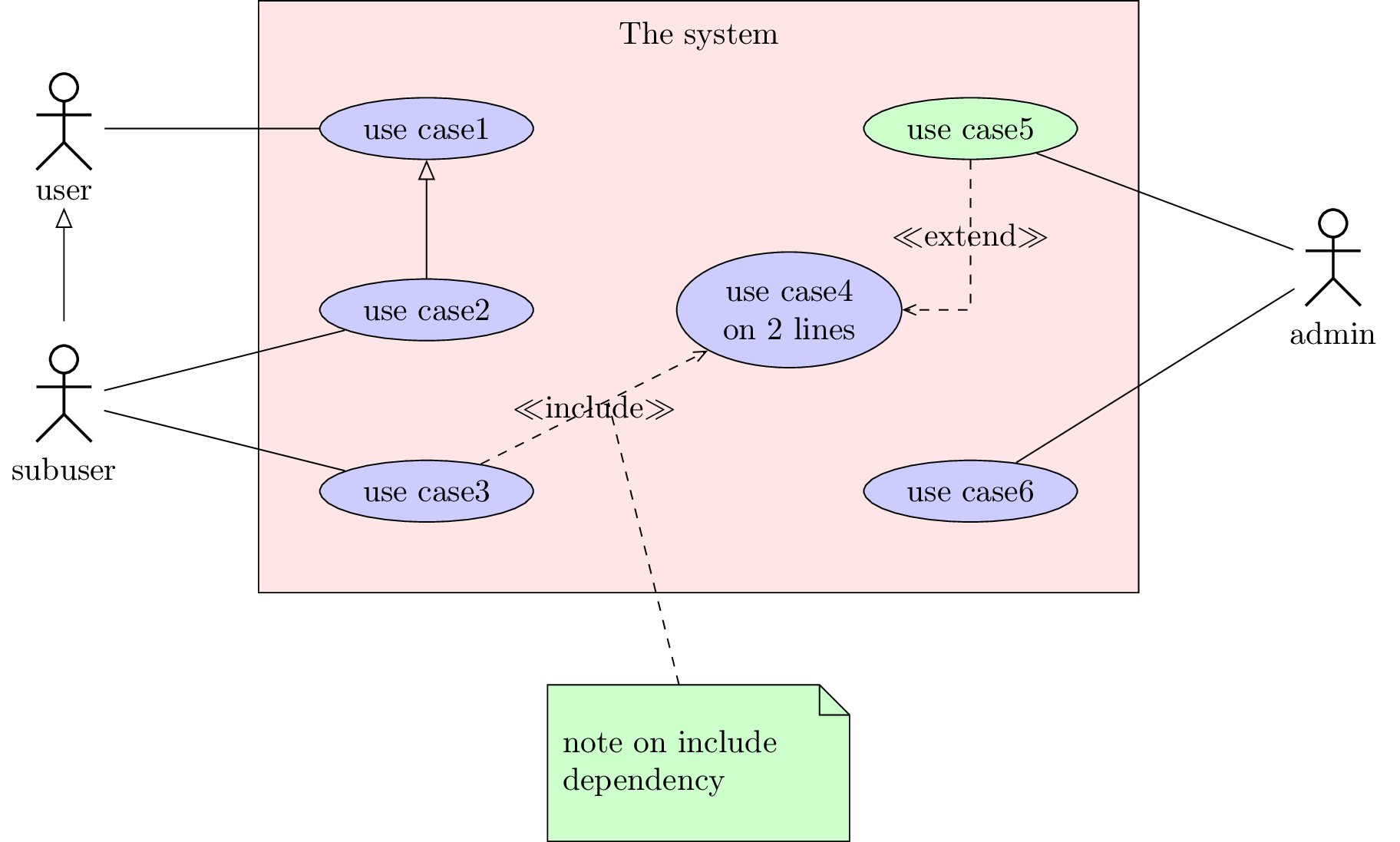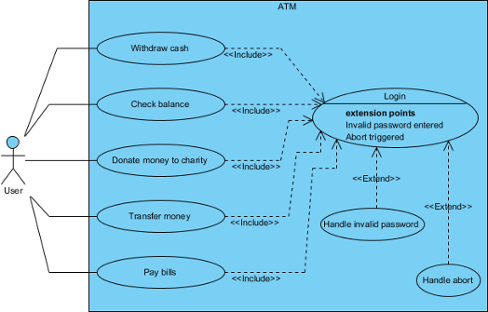38 use case diagram notations
A UML Use Case Diagram is a diagram that describes usage behaviors of a system from an outside user's point of view. Those usage behaviors are organized into units of use cases. Use Case Notation is used to describe a set of activities performed by actors on an object. When it is completed, a use case will yield a result that can be observed. Use Case Diagram Notations Use cases define interactions between external actors and the system to attain particular goals. A use case diagram contains four main components Actor Actors are usually individuals involved with the system defined according to their roles. The actor can be a human or other external system. Use Case
Use case diagrams consists of actors, use cases and their relationships. The diagram is used to model the system/subsystem of an application. A single use case diagram captures a particular functionality of a system. Hence to model the entire system, a number of use case diagrams are used. Purpose of Use Case Diagrams

Use case diagram notations
Use case diagram. 7. What are the notations for the Use case Diagrams? a) Use case b) Actor c) Prototype d) Use case and Actor Answer: d. 8. Which among the following can be heuristic for Use case diagram? a) The product can be made actor b) Never name actors with noun phrases c) Name Use cases with verb phrases d) All of the mentioned Notations used in use case diagram are: 1.Use case: Use case is the description of set of sequences of actions. It is graphically represented as an ellipse and labeled with the name of the use case. Use case represents an action performed by a system. Notation: 2.Actor: An actor represents a coherent set of roles that users of use case can play ... The subject (of use cases) is the system under design or consideration to which a set of use cases apply.The subject could be a physical system, software program, or smaller element that may have behavior, e.g. subsystem, component, or even class.. Subject is presented by a rectangle with subject name in upper corner with applicable use cases inside the rectangle and actors - outside of the ...
Use case diagram notations. Use-cases are one of the core concepts of object-oriented modeling. They are used to represent high-level functionalities and how the user will handle the system. UML Use Case Actor: It is used inside use case diagrams. The Actor notation is used to denote an entity that interacts with the system. A user is the best example of an actor. What are the notations for the Use case Diagrams? S Software Design. A use case B actor C prototype D use case and actor. Show Answer. How many types of arduinos do we have? S Arduino. A 5 B 6 C 8 A use case diagram is used to represent the dynamic behavior of a system. It encapsulates the system's functionality by incorporating use cases, actors, and their relationships. It models the tasks, services, and functions required by a system/subsystem of an application. It depicts the high-level functionality of a system and also tells how ... #2) Use Case: It represents a functional unit of a large application. Notation is horizontally shaped oval and is located inside the System boundary rectangle indicating that the use case applies to the mentioned subject. A specific use case can be referred to by other systems as well. So the system is not the owner of the use case.
Use case diagram. Creating Use Case Diagram for describing the behavior of the target system from an external point of view. Besides drawing the diagram, Visual Paradigm allows you to detail document the requirements through the Use Case Description. All these information can be output into HTML//PDF//MS Word formats. Notations - Summary. A UML use case diagram is composed of the following symbols: Figure 1. Symbols used in a use case diagram. Informal Semantics. Actor: An actor represents an external entity that interacts with a system. Since it is external to the system, the actor itself is not fully modeled by the system. However, in order to design the ... 37. What are the notations for the Use Case Diagrams? a) Use case. b) Actor c) Prototype d) a and b e) a, b and c 38. Which description is inappropriate? a) A use case is a type of agent that interacts with a product b) An actor is a type of complete interaction between product and its environment c) All of the mentioned d) None of the mentioned. A Sequence Frame Notation is a graphical notation used in a UML Sequence Diagram to provide a boundary to enclose all messages and lifelines of a communication sequence. A Sequence Frame Notation is drawn as a large rectangle with a pentagon at the top left corner. What are the types of symbols and notations of use case diagram?
What do you understand by Use Case Diagrams Notations? There are multiple notations that can be used in use case diagrams, but mostly it's actors and use cases that are being used. Use Cases Use cases are utilized to speak to significant level functionalities and how the client will deal with the framework. Draw the diagram with appropriate notations. Figure - an activity diagram. The above diagram prints the number if it is odd otherwise it subtracts one from the number and displays it. Uses of an Activity Diagram - Dynamic modelling of the system or a process. Illustrate the various steps involved in a UML use case. Use case diagram is a behavioral UML diagram type and frequently used to analyze various systems. They enable you to visualize the different types of roles in a system and how those roles interact with the system. This use case diagram tutorial will cover the following topics and help you create use cases better. Importance of use case diagrams. The use case diagram specifies how a system will perform, which is why it shows only the functionality of the system. Use Case Diagram Notation In this section, we will talk about the four basic types of use case diagram notations. They are as follows. Use Cases The use cases tell us about how the system will perform in different cases.
No two lifeline notations should overlap each other. They represent the different objects or parts that interact with each other in the system during the sequence. A lifeline notation with an actor element symbol is used when the particular sequence diagram is owned by a use case. A lifeline with an entity element represents system data.

British Library digitised image from page 389 of "Peru: incidents of ravel and exploration in the Land of the Incas. ... With illustrations"
A Use Case consists of use cases, persons, or various things that are invoking the features called as actors and the elements that are responsible for implementing the use cases. Use case diagrams capture the dynamic behaviour of a live system. It models how an external entity interacts with the system to make it work. Use case diagrams are responsible for visualizing the external things that interact with the part of the system.
To model interaction among objects inside a collaboration realizing a use case. It either models generic interactions or some certain instances of interaction. Notations of a Sequence Diagram Lifeline. An individual participant in the sequence diagram is represented by a lifeline. It is positioned at the top of the diagram. Actor
A use case diagram at its simplest is a representation of a user's interaction with the system that shows the relationship between the user and the different use cases in which the user is involved. A UML use case diagram is the primary form of system/software requirements for a new software program under developed. Use cases specify the expected behaviour (what), and […]
Use Case. A use case represents a user goal that can be achieved by accessing the system or software application. In Visual Paradigm, you can make use of the sub-diagram feature to describe the interaction between user and system within a use case by creating a sub-sequence diagram under a use case.You can also describe the use case scenario using the Flow of Events editor.
A UML use case diagram is the primary form of system/software requirements for a new software program underdeveloped. Use cases specify the expected behavior (what), and not the exact method of making it happen (how). Use cases once specified can be denoted both textual and visual representation (i.e. use case diagram).
Use Case Diagram For Student Result Management System 8/29 [Books] EXAMPLE 1.What is the Use Case Diagram? 2.Why Use-Case diagram? 3.Use-case diagram notations 4.How to draw a use-case diagram? 5.Tips for drawing a use-case diagram 6.An example of a use-case diagram 7.When to use a use-case diagram? Chapter 8: State Machine Diagram: UML
Notation. A use case diagram is a graph of actors, a set of use cases, possibly some interfaces, and the relationships between these elements. The relationships are associations between the actors and the use cases, generalizations between the actors, and generalizations, extends, and includes among the use cases. The use cases may optionally ...
Use Case Descriptions • actors - something with a behavior or role, e.g., a person, another system, organization. • scenario - a specific sequence of actions and interactions between actors and the system, a.k.a. a use case instance • use case - a collection of related success and failure scenarios, describing actors using the system to
Use case diagram symbols and notation The notation for a use case diagram is pretty straightforward and doesn't involve as many types of symbols as other UML diagrams. You can use this guide to learn how to draw a use case diagram if you need a refresher. Here are all the shapes you will be able to find in Lucidchart:
Use case is used to capture high level functionalities of a system. Actor Notation. An actor can be defined as some internal or external entity that interacts with the system. An actor is used in a use case diagram to describe the internal or external entities. Initial State Notation. Initial state is defined to show the start of a process.
Use case diagrams specify how the system interacts with actors without worrying about the details of how that functionality is implemented. Basic Use Case Diagram Symbols and Notations. System Draw your system's boundaries using a rectangle that contains use cases. Place actors outside the system's boundaries.
Use Case Diagram Symbols — In Unified Modelling Language (UML), use case diagrams are used to show the interactions between actors and a system. The system ...

British Library digitised image from page 58 of "An account of the several charities and estates, held in trust, for the use of the poor in the parish of Saint Leonard, Shoreditch, Middlesex; and of benefactions to the same"
The subject (of use cases) is the system under design or consideration to which a set of use cases apply.The subject could be a physical system, software program, or smaller element that may have behavior, e.g. subsystem, component, or even class.. Subject is presented by a rectangle with subject name in upper corner with applicable use cases inside the rectangle and actors - outside of the ...
Notations used in use case diagram are: 1.Use case: Use case is the description of set of sequences of actions. It is graphically represented as an ellipse and labeled with the name of the use case. Use case represents an action performed by a system. Notation: 2.Actor: An actor represents a coherent set of roles that users of use case can play ...
Use case diagram. 7. What are the notations for the Use case Diagrams? a) Use case b) Actor c) Prototype d) Use case and Actor Answer: d. 8. Which among the following can be heuristic for Use case diagram? a) The product can be made actor b) Never name actors with noun phrases c) Name Use cases with verb phrases d) All of the mentioned

British Library digitised image from page 120 of "Peru: incidents of ravel and exploration in the Land of the Incas. ... With illustrations"

www.larskaizer.com ***For all journalists and users of our free brand content, we'd really be grateful if you credit us and include a link to our website where-ever you feature us! Help a small brand out!*** Inclusivity and creativity is at the heart of what we do. Samsung phone cases do not have to be boring. We create unconventionally stylish tech accessories and phone cases for Samsung and iPhone. Use code LK10 for 10% off with Free Shipping Worldwide.

Time signature...Irrational meters: the use of these signatures makes metric relationships clearer or more obscure to the musician.

British Library digitised image from page 89 of "Historical Memorials of Canterbury. The Landing of Augustine, the Murder of Becket, Edward the Black Prince, Becket's Shrine"


























0 Response to "38 use case diagram notations"
Post a Comment